Documents used along the form
The Louisiana Quitclaim Deed is a useful document for transferring property ownership without warranties. When completing a property transfer, various other forms and documents may also be necessary to ensure a smooth and legally compliant process. Below is a list of commonly used documents that complement the Quitclaim Deed in Louisiana.
- Property Transfer Tax Declaration: This document is required to report the transfer of property to the local tax authority. It helps assess any applicable property taxes based on the new ownership.
- Affidavit of Identity: This sworn statement verifies the identity of the parties involved in the transaction. It is often used to prevent fraud and ensure the authenticity of the deed.
- Title Insurance Policy: This policy protects the buyer against any future claims or disputes over property ownership. It provides peace of mind regarding the title's validity.
- Warranty Deed: Unlike a quitclaim deed, a warranty deed offers guarantees about the title's condition. It assures the buyer that the seller has a clear title to the property.
- Bill of Sale: This document is used to transfer personal property, such as furniture or appliances, that may be included in the sale of real estate.
- Closing Statement: This statement outlines the financial details of the transaction, including the purchase price, closing costs, and any adjustments. It serves as a final accounting of the sale.
- Power of Attorney: If one party cannot be present for the signing, a power of attorney allows someone else to sign on their behalf, ensuring the transaction can proceed smoothly.
- Loan Documents: If the buyer is financing the property, various loan documents will be necessary, including a mortgage agreement and promissory note, detailing the terms of the loan.
- Homeowners Association (HOA) Documents: If the property is part of an HOA, these documents provide rules, regulations, and any fees associated with the community.
Understanding these additional forms can help streamline the property transfer process. Each document plays a vital role in ensuring that the transaction is completed correctly and that all parties are protected. Being well-informed about these requirements can lead to a smoother experience when dealing with real estate in Louisiana.
